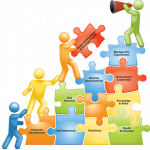What If Our Jobs Were To Serve?
 I used to live in Taos, New Mexico, where I bought everything I ate from a small grocery called Cid’s Market. Run by Cid and Betty Backer, they always offered fresh organic produce, freshly cooked healthy meals, and a health/vitamin section that had everything I wanted. The store environment was happy and very obviously committed to the Taos community. It felt like MY STORE each time I went in. Any question I had was answered; anything I needed was procured, even if it meant they went out and bought me the item at a different store! I was a rabid fan.
I used to live in Taos, New Mexico, where I bought everything I ate from a small grocery called Cid’s Market. Run by Cid and Betty Backer, they always offered fresh organic produce, freshly cooked healthy meals, and a health/vitamin section that had everything I wanted. The store environment was happy and very obviously committed to the Taos community. It felt like MY STORE each time I went in. Any question I had was answered; anything I needed was procured, even if it meant they went out and bought me the item at a different store! I was a rabid fan.
Apparently, I wasn’t the only one who loved them. In the 11 years I lived there (1989-2000) I watched as they grew from a small store to a three story building taking up half a city block. Their service to customers was exceptional. Every morning as the store opened, Cid held a brief meeting with the entire team. “Who pays your salary?” he’d ask. They’d respond “The Customer!” And then they’d start their day.
Everyone’s job was to take care of customers, whatever that entailed. They didn’t need to ‘follow the rules’: that WAS the rule. And creativity and service ensued: In the health department, the manager created free evening community programs for different groups – diabetes sufferers, parents with kids who wouldn’t eat veggies; the produce manager created free cooking classes and lessons on growing organic veggies. Everyone was trusted to make their best decisions and the customers felt their commitment and respect. And in 1993 that was unusual.
One year, on a plane to Mexico to give a keynote address about Servant Leadership, I noticed Cid and Betty.
“Are you going on vacation?” I asked?
“No. We’re going to a conference on Servant Leadership.”
“Oh. I didn’t think a grocery store would seek out that sort of thing.”
“We’re going mostly to learn what we need to learn to serve our employees. If we can’t give them the respect they deserve, and create an environment in which they thrive, we can’t run a business that will also serve our customers. We go to one conference a year to learn all the tools we can so we all have the best knowledge available to serve with.”
They understood that their success came from serving people, community, customers and staff. And they actively made it a priority.
WHAT ARE OUR JOBS?
When corporations consider what their jobs are, they sometimes think Profits, or Products, or Shareholders. But I think it’s something else. Think about it: there’s no job that doesn’t include serving:
- Sell more? Serve customers.
- Grow the business, be respected in the industry, and retain clients? Serve the company.
- Retain and inspire good people with tools to inspire creativity? Serve employees.
- Maintain optimal skills and health? Serve ourselves.
- Maintain communication skills? Serve each other.
Without hiring and retaining good people that know how to lead collaboratively; without the skills to help managers, sales folks, team leaders, facilitate buy-in; without the creativity from an entire group that, working together, can develop top notch solutions that produce competitive and imaginative solutions; none of us are in business. No matter what our jobs, our core business is to serve.
Unfortunately, too many of us unwittingly follow trends that take us away from our core business of serving. For example, too many companies have chosen the trend of using their websites to collect names. They embed pop ups to retrieve email addresses, making it impossible to find answers to questions and rendering the site unusable (unless you agree to the cookies) and annoying folks with real interest who might even be customers.
Obviously they’re putting their own goals before those of a possible customer. Why would a company do that? Especially the smaller companies who truly depend on offering information as a sales strategy. Is acquiring my name to push out marketing materials that important? Don’t they know I’ll leave the site rather than agree to accept more spam? That they’ll lose my business because I don’t want my name captured? Those companies have lost their way: they are only serving themselves.
OUR JOBS ARE TO SERVE
What if our real jobs weren’t only to collect data, or create content, or push products? What if our jobs were merely to serve? That requires a new skill set, a different viewpoint that produces very different results:
- Leaders wouldn’t be getting resistance because they’d attain buy-in and work collaboratively to engage all voices before making change.
- Sellers would only pitch to those ready to buy, and use the bulk of their now-wasted time to facilitate people them through their buying decision path as they figured out how to achieve their own type of excellence (and possibly buy solutions).
- Managers would hire people whose goal was to serve and retain them because the company’s practices facilitated their excellence.
- Coaches would use Facilitative Questions to guide folks to their own answers, trusting each person had their own type of excellence to achieve without the biases of an outsider.
- Tech folks would save a great deal of time on projects because they’d be curious without bias, gathering the most accurate data the first time and avoiding biased assumptions that caused flawed results and user complaints.
- Companies would be aware of the environment, the role they play in it, and factor in climate issues as a way to serve the planet while serving customers.
- Senior Management would dictate that each employee, as well as customers, be cared for respectfully. When an employee isn’t happy, it’s difficult for them to care about customers.
By maintaining focus on ourselves, on our individual needs, we miss the larger picture. By using our jobs and companies as the vehicle to serve others and the planet, we will all live in an excellent world.
__________________________
Sharon-Drew Morgen is a breakthrough innovator and original thinker, having developed new paradigms in sales (inventor Buying Facilitation®, listening/communication (What? Did you really say what I think I heard?), change management (The How of Change™), coaching, and leadership. She is the author of several books, including her new book HOW? Generating new neural circuits for learning, behavior change and decision making, the NYTimes Business Bestseller Selling with Integrity and Dirty Little Secrets: why buyers can’t buy and sellers can’t sell). Sharon-Drew coaches and consults with companies seeking out of the box remedies for congruent, servant-leader-based change in leadership, healthcare, and sales. Her award-winning blog carries original articles with new thinking, weekly. www.sharon-drew.com She can be reached at sharondrew@sharondrewmorgen.com.
Sharon Drew Morgen September 16th, 2024
Posted In: News


